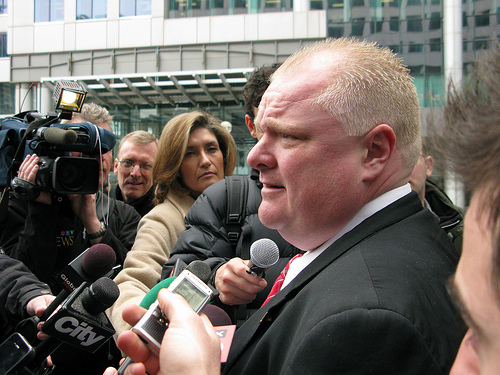Please support our coverage of democratic movements and become a supporting member of rabble.ca.
Where would we be without print? I don’t mean the printing press and movable type invented by Gutenberg. I mean the newspapers that were one result, and that have accompanied modern history, for better and worse.
Too abstract? Then think of the Rob Ford crack video story. We’d be nowhere on it without print media, it wouldn’t exist, along with its ever-widening ripples of insight into how our society functions. That’s mostly been due to the Star, but the Globe, goaded by the Star, ran its own investigation of the Ford family past, which gave context to the mayor’s addiction issues, along with fuel for speculation about the familial factors that motivate his self-destructive, attention-seeking behaviour. Even the pro-Ford Sun contributed, with a three-word front page, Go To Rehab, perhaps based on its own form of investigation: talk to former mayor’s staff now employed there.
Where have broadcast media been on this? Hard to find. They’re milling outside the mayor’s office with their cumbersome crews or back in studio trying to look relevant by “tracking” (the most dreaded word in news) the story, i.e. reading the papers and announcing what they found. Why have they been so marginal? Maybe it’s the technology but it’s also the narcissism.
That’s an inherent problem, not a personal one. TV news pulls focus from the story onto its teller. This became evident in the 1980s with the rise of haircasting. You could tell print from TV reporters at events by those who were looking for the story versus those scanning, while primping, for their cameras. In theory you can have TV stories without a focus on reporters, or even shots of them. But ego is a mighty force and, like information on the Internet, wants to be free. If you could liquefy it you could meet every energy need.
Print journalists also have egos, often massive, but they tend to try to sate them by telling grandiose tales among their peers, not preening as larger-than-life superstars. Two words, that have become one: Duffy/Wallin. In theory they were TV journalists but in reality they were stars. A sense of privilege followed. Everywhere they went, people (some; others weren’t interested) basked in their glow. Inevitably they became grotesque cartoons of what they’d pretended to dispassionately report on. That story, too, by the way, was largely uncovered in print — aside from CTV’s Bob Fife, whose background is print and who revealed the $90,000 Duffy payoff, thus becoming an exception that proves the rule.
The Ford video story has also resurrected, for many readers, the thrill of reporting as opposed to the scourge of opinionation. (Mea culpa, a lot.) Many “news” outlets today provide little except commentary; it’s cheaper and easier than gathering news. But a whole city (and beyond) now finds itself checking for the latest scoop, a term that got prematurely buried. What happens next is more gripping than what’s thought next. Journalists, too, are rediscovering what drew them to the field: it’s challenging, dangerous and fun to pursue and reveal secrets; it’s like the games you loved as a kid but with an adult reward.
It’s also revived a sense of vitality in local news. Here is where we live and make connections. Distant scandals, like the Senate, distance us; we become abstractions in our own minds. Local stories happen where we wake up, travel to work, where our kids go to school — they’re also a classroom in which we learn to evaluate the rest of the world. The Ford story, I’d say, has lent resonance to those tales from the Senate crypt. So it’s a shame that Postmedia will eliminate publishers from its local papers and that there’s talk about newspapers becoming “regional.” I don’t know what that means but it sounds lifeless.
Newspaper editors once felt they couldn’t compete with breaking news on TV. Now, with the rise of websites, that’s reversed. Newspapers are the go-to medium, and have the skills for it. It’s true they’re in a financial crisis but it would be a pity if they don’t find a way out. Besides, as Hegel said, the owl of Minerva rises only at dusk — i.e., you get smart mostly when you’re nearly dead.
This article was first published in the Toronto Star.
Photo: West Annex News/flickr




